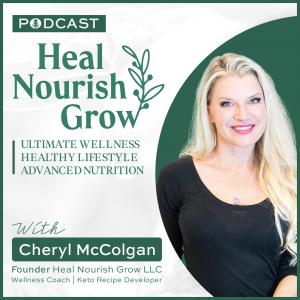Heal Nourish Grow Podcast

End Migraines and Headaches Using the EAT Method
In this episode Dr. Meg Mill talks all about headaches and migraines and how to combat them. Like other functional medicine doctors, she is focused on finding the root cause of headaches to help get rid of them for good. She is offering a special eight week program in January to help you finally get the migraine relief you deserve and we also talk about migraines and nutrition. Did you enjoy today’s show? Let me know by leaving me a review for the show on Apple Podcasts, or wherever you are listening from today! Sharing the show with friends or leaving a review helps to much by allowing people to find the show. Watch the interview on You Tube CONNECT WITH CHERYL Website: https://healnourishgrow.com Show Notes: https://healnourishgrow.com/podcastepisodes Instagram: https://www.instagram.com/healnourishgrow Facebook: https://www.facebook.com/healnourishgrow YouTube: https://www.youtube.com/healnourishgrow Pinterest: https://www.pinterest.com/HealNourishGrow TikTok: https://www.tiktok.com/@healnourishgrow Dry Farm Wines: https://www.dryfarmwines.com/healnourishgrow Amazon Store: https://www.amazon.com/shop/healnourishgrow Links to All of My Favorite Products With Discounts: https://healnourishgrow.com/shop CONNECT WITH DR. MILL Website: https://www.megmill.com January 2022 Program: http://happinessbeyondheadaches.com Instagram: https://www.instagram.com/drmegmill Disclaimer: Links may contain affiliate links, which means we may get paid a commission at no additional cost to you if you purchase through this page. Read our full disclosure here. Cheryl McColgan: Hi, everyone. Welcome back to The Heal Nourish Grow Podcast. Today, I am joined by Dr. Meg Mill, and I'm really excited to share her knowledge with you because she focuses a lot on headaches, which is something I know a lot of people in this audience struggle with. So, welcome, Dr. Mill. Can you just give us some of your background, how you... Before you get to how you got into this work, you were originally, I believe, a pharmacist, so maybe you could kinda tell us about your progression of moving into functional medicine. Dr. Meg Mill: Yes, absolutely, thank you so much for having me here. I spent almost 20 years actually practicing as a clinical pharmacist before I made my way into functional medicine, and I kind of have two tracks of how I ended up in this space, and one was a personal journey and the other one was just from experience with patients. So I just... Over the years of working with people, we're seeing people, I would say, survive rather than thrive, I would see people coming in with more and more medications and just really still not feeling their best. And although there's a really wonderful purpose for medications, it's not the answer for everything. And when you're not looking into some of the root causes, people were getting more and more sick while kind of piling up and getting side effects and other things from medications. Dr. Meg Mill: And in the same vein, I actually had spent years with IBS and had been jumping around to different gastroenterologists and getting to them like, "Oh, you're fine, but... " And I did not feel fine by any means. And so I was looking for other answers and just found through that journey and my own personal experience, was able to find function medicine and heal myself and then go on to change career paths and go back and get certifications to practice. And I do see... It's amazing the difference you can see for people when you're looking into the root cause, so many things can be fixed and healed that way. Cheryl McColgan: Yeah, that is a real frustration in western medicine, and it's certainly something that in the... I'm very involved in the keto low-carb space and biohacking stuff, and it's certainly a conversation that we have quite often in the community about, why don't we address the root cause more often? So as you moved away from pharmacy into functional...






 Visit Podcast Website
Visit Podcast Website RSS Podcast Feed
RSS Podcast Feed Subscribe
Subscribe
 Add to MyCast
Add to MyCast